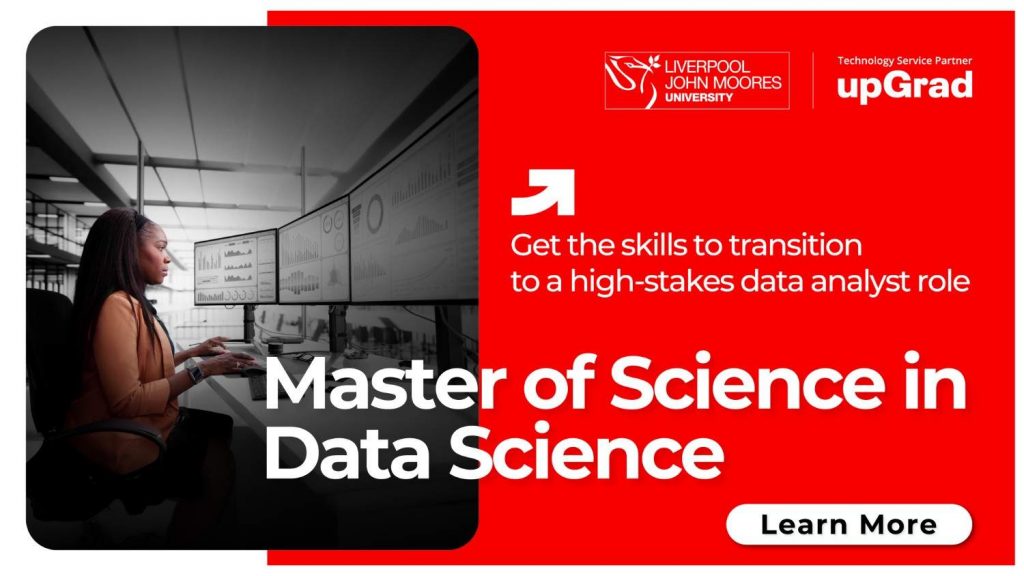The world runs on data today, and deciding between a Data analyst vs. a Data scientist career can feel confusing. Both roles are vital to how companies make smarter decisions, but they use different tools, methods, and mindsets. Recent reports from the U.S. Bureau of Labor Statistics show that data scientist jobs are expected to grow by 36% from 2023 to 2033, far faster than most other fields. Whether you’re drawn to analysis or advanced modelling, this article will help you see which path fits your goals best.
Source: U.S. Bureau of Labor Statistics
Take your skills to the next level – Explore Data Science and Analytics Courses Online
Understanding the Roles: Data Analyst vs Data Scientist
When exploring Data analyst vs Data scientist, it’s important to understand how the roles differ and where they overlap. Both work with data, but their goals, tools, and career paths are distinct. Knowing the difference between a data analyst and a data scientist helps you make an informed career choice.
1. What Does a Data Analyst Do?
Data analysts turn raw data into actionable insights to support decision-making.
They:
- Clean, organize, and manage datasets
- Build dashboards and visual reports
- Spot patterns, trends, and anomalies
- Communicate findings to teams and stakeholders
Common tools: Excel, SQL, Tableau, and Power BI
Also read: Unveiling the Potential of the Big Data Analyst Role in the US
2. What Does a Data Scientist Do?
Data scientists explore data to predict outcomes and solve complex problems.
They:
- Develop predictive models and machine learning algorithms
- Work with large, unstructured datasets
- Apply statistics to forecast trends
- Collaborate with engineers and business teams for implementation
Common tools: Python, R, TensorFlow, Spark, and Hadoop
Also read: Top Data Visualization Tools for Data Scientists
3. Key Differences Between the Two Roles
The table below summarizes the key differences between a Data Analyst and a Data Scientist:
| Aspect | Data Analyst | Data Scientist |
| Focus | Analyzes past and current trends | Predicts future trends and automates tasks |
| Skillset | SQL, Excel, and visualization | Programming, ML, statistics, and big data |
| Deliverables | Reports and dashboards | Models, algorithms, and predictive insights |
| Average Salary (US) | USD 5 lakh – 10 lakh per annum | USD 8 lakh – 20 lakh per annum |
In short, data analysts explain what’s happening now, while data scientists forecast what could happen next. Choosing the right role depends on whether you enjoy storytelling through data or building predictive solutions. Both offer exciting opportunities in a data-driven world.
Also read: Data Analysis vs Data Science

Skills You Need to Succeed in Each Role
Knowing the difference between data science and data analytics also means understanding what it takes to excel in each path. While both rely on data-driven insights, their core skills vary.
For Data Analysts:
- Strong with Numbers: Comfortable analyzing trends and patterns.
- Tool Savvy: Skilled in Excel, SQL, and dashboards like Power BI.
- Visual Storytelling: Turns raw data into clear, visual insights.
For Data Scientists:
- Coding Knowledge: Uses Python or R to experiment and build models.
- Machine Learning: Creates algorithms that predict or classify data.
- Big Data Handling: Works with tools like Hadoop or Spark for scale.
Also read: Essential Data Science Skills Taught in Online Courses
Career Opportunities and Salary Insights
Exploring the Data analyst vs Data scientist roles reveals distinct career paths and earning potential. Both are in high demand, yet the skills, responsibilities, and salaries differ significantly, making it important to know where your strengths fit.
Have a look at the table below to understand the salary insights for data analyst and data scientist job roles:
| Role | Average Monthly Salary | Key Responsibilities |
| Data Analyst | USD 5 lakh – 10 lakh per annum | Turn raw data into actionable insights. |
| Data Scientist | USD 8 lakh – 20 lakh per annum | Build predictive models and advanced analytics. |
Career Opportunities as a Data Analyst:
- Industries: Finance, Healthcare, Retail, Marketing, E-commerce, Technology
- Companies hiring: Amazon, JPMorgan Chase, Deloitte, Google, Microsoft
Career Opportunities as a Data Scientist:
- Industries: AI & Machine Learning, Technology, Healthcare, Finance, Consulting
- Companies hiring: Facebook (Meta), IBM, Netflix, Capital One, Airbnb
Also read: The Future of Data Science
Launch Your Data Career with upGrad
If you’re weighing the difference between a data analyst and a data scientist, online programs through upGrad USA make the choice clearer. As a leading online learning platform, upGrad partners with top universities to offer hands-on courses, real-world projects, and expert mentorship, helping you gain the skills companies actually seek. Whether you want to analyze trends or build predictive models, these programs let you learn flexibly and accelerate your career.
Explore online data science and data analytics courses today and take your first step into the growing world of data.
- Master of Science in Data Science from Liverpool John Moores University
- Executive Diploma in Data Science and AI from IIT Bangalore
- Post Graduate Certificate in Data Science & AI (Executive) from IIT Bangalore
🎓 Explore Our Top-Rated Courses in United States
Take the next step in your career with industry-relevant online courses designed for working professionals in the United States.
- DBA Courses in United States
- Data Science Courses in United States
- MBA Courses in United States
- AI ML Courses in United States
- Digital Marketing Courses in United States
- Product Management Courses in United States
- Generative AI Courses in United States
FAQs on Data Analyst vs Data Scientist
A data analyst focuses on interpreting and visualizing existing data to explain what happened, while a data scientist uses advanced models and algorithms to predict what could happen next.
Not always. While many have one, you can also build a strong portfolio through online certifications, hands-on projects, and real-world problem-solving experience.
Yes, a Data Analyst can become a Data Scientist by learning Python or R, understanding machine learning, and gaining experience in advanced statistics and data modelling to handle complex predictive tasks.
The knowledge of the following tools will help you to become:
1. Data Analyst: Excel, SQL, Tableau, Power BI
2. Data Scientist: Python, R, TensorFlow, Spark, Jupyter Notebook
It is beneficial to know about coding to become a successful data analyst. Basic coding in SQL or Python helps automate tasks, manage large datasets, and make data analysis more efficient, though the role doesn’t demand deep programming expertise.












.png)







